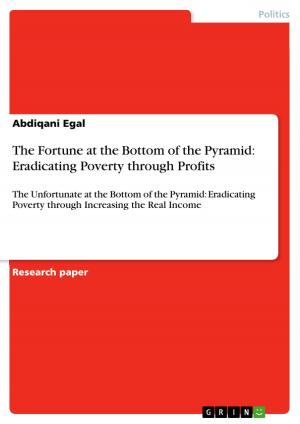Aspects of the English language in South Africa - focusing on language identity and language varieties
focusing on language identity and language varieties
Nonfiction, Entertainment, Drama, Anthologies| Author: | Hildegard Schnell | ISBN: | 9783638615235 |
| Publisher: | GRIN Publishing | Publication: | March 14, 2007 |
| Imprint: | GRIN Publishing | Language: | English |
| Author: | Hildegard Schnell |
| ISBN: | 9783638615235 |
| Publisher: | GRIN Publishing |
| Publication: | March 14, 2007 |
| Imprint: | GRIN Publishing |
| Language: | English |
Seminar paper from the year 2006 in the subject English Language and Literature Studies - Linguistics, grade: 1,7, University of Duisburg-Essen, course: English in Africa, 14 entries in the bibliography, language: English, abstract: Due to the spread of English to so many parts of the world which was triggered during the colonial era and by migration of English-speaking people, the importance of English not only as a language of commerce, science and technology but also as an international language of communication has been realized (Platt, Weber, Ho 1984: 1). In my research paper I will provide an overview of the English language in South Africa by looking at its origins concerning the historical background. Furthermore, I am going to focus on the English language in South Africa in more detail in order to point out the influence of the immigrants' speech from England and Scotland on some phonetic features of South African English. Eventually, I am going to discuss whether the spread of English can be seen as an evidence of a 'killer language' which has been used as a tool for subtle linguistic imperialism, occurring at the expense of local languages, stabilizing hierarchical structures and reinforcing existing status differentials (de Klerk 1996: 7-8). So, the main purpose of my paper is to show that the English language in South Africa before, during and after apartheid policy is one of the official languages since there is more than one local language in a multilingual nation. While English in South Africa is seen by many 'as a medium of achieving and announcing independence and maturity, for many others English represent colonialism, power and elitism, and acts as a vehicle of values not always in harmony with local traditions and beliefs' (de Klerk 1996: 7). In this chapter, I will focus on the historical and social background of the English language in South Africa in regard to different language varieties. In the following, based on Roger Lass's article 'South African English', I will, as I mentioned before, refer to the historical background of the English language in South Africa and so discuss the aspect of different language varieties that were influenced by the English language. Then, concerning L.W. Lanham's The Standard in South African English and its Social History, I will point out in which way the English language developed there. By referring to the historical background in more detail, I will eventually focus on Josef Schmied's English in Africa, thus stressing the strategic importance of South Africa for the British.
Seminar paper from the year 2006 in the subject English Language and Literature Studies - Linguistics, grade: 1,7, University of Duisburg-Essen, course: English in Africa, 14 entries in the bibliography, language: English, abstract: Due to the spread of English to so many parts of the world which was triggered during the colonial era and by migration of English-speaking people, the importance of English not only as a language of commerce, science and technology but also as an international language of communication has been realized (Platt, Weber, Ho 1984: 1). In my research paper I will provide an overview of the English language in South Africa by looking at its origins concerning the historical background. Furthermore, I am going to focus on the English language in South Africa in more detail in order to point out the influence of the immigrants' speech from England and Scotland on some phonetic features of South African English. Eventually, I am going to discuss whether the spread of English can be seen as an evidence of a 'killer language' which has been used as a tool for subtle linguistic imperialism, occurring at the expense of local languages, stabilizing hierarchical structures and reinforcing existing status differentials (de Klerk 1996: 7-8). So, the main purpose of my paper is to show that the English language in South Africa before, during and after apartheid policy is one of the official languages since there is more than one local language in a multilingual nation. While English in South Africa is seen by many 'as a medium of achieving and announcing independence and maturity, for many others English represent colonialism, power and elitism, and acts as a vehicle of values not always in harmony with local traditions and beliefs' (de Klerk 1996: 7). In this chapter, I will focus on the historical and social background of the English language in South Africa in regard to different language varieties. In the following, based on Roger Lass's article 'South African English', I will, as I mentioned before, refer to the historical background of the English language in South Africa and so discuss the aspect of different language varieties that were influenced by the English language. Then, concerning L.W. Lanham's The Standard in South African English and its Social History, I will point out in which way the English language developed there. By referring to the historical background in more detail, I will eventually focus on Josef Schmied's English in Africa, thus stressing the strategic importance of South Africa for the British.















